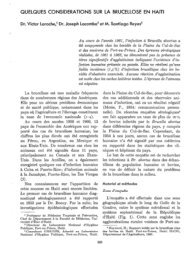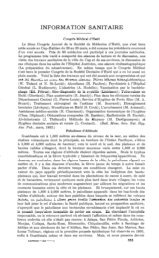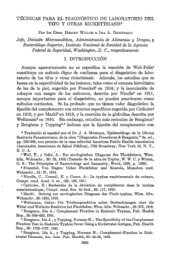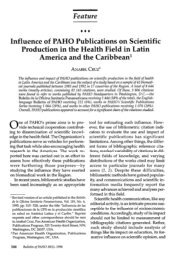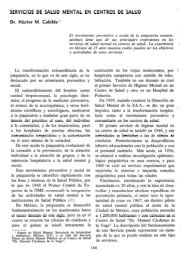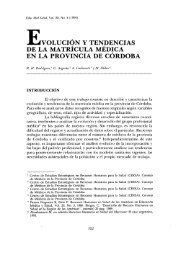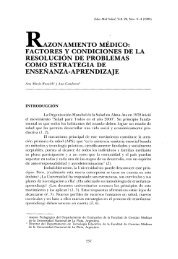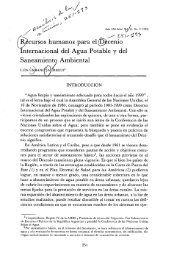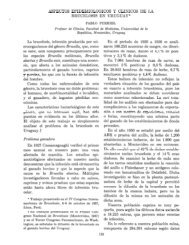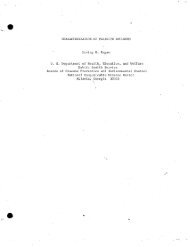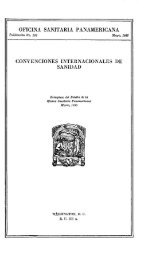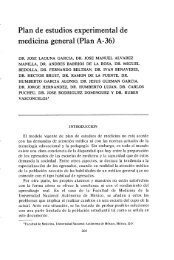- Page 1 and 2:
L 00111111 MASTER COPY - NO TOCAR B
- Page 3 and 4:
- ii - liancock, W., D. Magerlein y
- Page 5 and 6:
FOREWORD These last years, PAHO wit
- Page 7 and 8:
Workshop .- Education in Operationa
- Page 9 and 10:
-3. The format of the workshop was
- Page 11 and 12:
-5- 2. Programs for bringing togeth
- Page 13 and 14:
II. R.commendations -7- A series of
- Page 15 and 16:
-9- there are technically trained i
- Page 17 and 18:
-11- and selected individuals who h
- Page 19 and 20:
-13- 6. In order to improve the qua
- Page 21 and 22:
-15- cnve!opment will typically be
- Page 23 and 24:
-17- 16. All participants sbould pr
- Page 25 and 26:
A. Short Courses -19- Short courses
- Page 27 and 28:
-21- 4. Presentation of a case to b
- Page 29 and 30:
Topic Introduction to Systems Analy
- Page 31 and 32:
-25- 12. Elementary Statistics ior
- Page 33 and 34:
-27- 8. Applications of data proces
- Page 35 and 36:
-29- problems. The graduate should
- Page 37 and 38:
-31- Lblo-w. Also given is that typ
- Page 39 and 40:
- 33 -' -Case Mix Definition by Dia
- Page 41 and 42:
- 35 - Acknowledgment The authors w
- Page 43 and 44:
ML ICAL CAE1 Februurl 1980, Vol. XV
- Page 45 and 46:
X;' VIII, No. 2. Suippllce,t - 39 -
- Page 47 and 48:
- 41 - dMLDICAL C.ARE '.Fcbrtanj 19
- Page 49 and 50:
\'nKV 111,I No. 2, IIIJ·,ri - 43 -
- Page 51 and 52:
Vol. XVIII, No. 2, Supplenent - 45
- Page 53 and 54:
'Vol. XVIII. No. 2, Supplemient - 4
- Page 55 and 56:
?Vol. XVIII. No. 2. Sttilluleareilt
- Page 57 and 58:
.'yo. XVIII. No. 2, Supplentcsit Si
- Page 59 and 60:
.V'oL XVIII. No. 2. Stpphlidary dia
- Page 61 and 62:
Vol..'XVlII, No. 2, Supplement - 55
- Page 63 and 64:
- 57 - MEDICAL CARE Febiuary 1980,
- Page 65 and 66:
- 59 - .SlDiCL ( :AL.. FcbnartlrJ p
- Page 67 and 68:
Vol. XVIII, No. 2, Suppletiment - 6
- Page 69 and 70:
Vol. XVIII, No. 2, Supplenwt - 63 -
- Page 71 and 72:
- 65 - £.¡EDCAL CARE ebrNuarV 1;9
- Page 73 and 74:
Vol. XVIII, No. 2, Sn",,phl- steal
- Page 75 and 76:
VoL XVIII. No. 2, Supplemnlent - 69
- Page 77 and 78:
'XVII. No. 2. Supplement - 71 - P)i
- Page 79 and 80:
;.'. 'Vol. XVIII. No. 2. Siupplemen
- Page 81 and 82:
:`". XVIII, No. 2. Stupplenent - 75
- Page 83 and 84:
,VoL XVIII, No. 2, Supplement Major
- Page 85 and 86:
.. Vol. XVIII, No. 2. Supl|lemcent
- Page 87 and 88:
i,..X VIII. No. 2. Supplemeiint - 8
- Page 89 and 90:
T XVIII. No. 2. S.pphlts"t .i¿jor
- Page 91 and 92:
·. ¥XVIII. No. 2 Supplement )i, "
- Page 93 and 94:
- 87 - 'i1. XVIII. No. -. Supplemne
- Page 95 and 96:
Vl. \'ll. No. 2. Sntiít'ult.uit M.
- Page 97 and 98:
- 91 - R. FRIRICHIS AND J. PRAWDA W
- Page 99 and 100:
- 93 - 414 R. FRRKICkIS AND J. PRAW
- Page 101 and 102:
- 95 - R. F'RERICItS'AND J. PRAWDA
- Page 103 and 104:
- 97 - R. F'RRICHS AND J. PRAWDA wh
- Page 105 and 106:
- 99 - 420 R. MFRIlC}IS AND J. PRAW
- Page 107 and 108:
V - 101 - McUCi. (:Au AWuu IMI. VoL
- Page 109 and 110:
GREENLAND ET AL - 103 - the case (p
- Page 111 and 112:
CREENLAND iT AL - 105 - TABLE 2. Fi
- Page 113 and 114:
GREENLAND ET AL. 3. Cornfleld J, Ha
- Page 115 and 116:
160 I indicates the flow of patient
- Page 117 and 118:
162 CONGESTION POINTS ANU CONTROL.A
- Page 119 and 120:
164 c 8o Table 4. The cffect of cha
- Page 121 and 122:
166 B. LEV etal. significant differ
- Page 123 and 124:
MEREDITH - 117 - ciety. However. ch
- Page 125 and 126:
I MEREDITH - 119 - varying oulcome
- Page 127 and 128:
MEDICAL CARE ,arch 1981, Vol. XIX,
- Page 129 and 130:
%,I. XIX, No. 3 iclnts. It should d
- Page 131 and 132:
n'ol. XIX, No. 3 - 125 - tailed exa
- Page 133 and 134:
1 Vol. XIX. No. 3 - 127 - tant for
- Page 135 and 136:
Vi. .XIX, No. 3 - 129 - tom' s reco
- Page 137 and 138:
- 131 - A \ ,,1. XIX, No. 3 PEHFOHR
- Page 139 and 140:
V Xl. IX, No. 3 - 133 - PERFORMANCE
- Page 141 and 142:
- 135 - The fourth requirement is l
- Page 143 and 144:
- 137 - Systems and Procedures of P
- Page 145 and 146:
- 139 - 2. ldentify problemn areas
- Page 147 and 148:
c 1 '-a
- Page 149 and 150:
u. o a.- 1 W. LZi - 143 - c c S C.
- Page 151 and 152:
- 145 - Thc cu rrent appointmren t-
- Page 153 and 154:
- 147 - A pure block appointment sy
- Page 155 and 156:
- 149 - ihe future. It was discover
- Page 157 and 158:
- 151 -
- Page 159 and 160:
- 153 - Figui.'¢ VII. Patient Arri
- Page 161 and 162:
- 155 - sonnel working in positions
- Page 163 and 164:
- 157 - 17. Keep the time span of t
- Page 165 and 166:
- 159 - TABLE I: Pnmary DesklConsul
- Page 167 and 168:
.Recomme;tded systenz - 161 - .;any
- Page 169 and 170:
- 163 - system, there is nr'. :vste
- Page 171 and 172:
- 165 - - A major problem with such
- Page 173 and 174:
- 167 - T1c Iteole of Olieraionls R
- Page 175 and 176:
- 169 - Larry J. Shumc- Harvey Wolf
- Page 177 and 178:
- 171 - '- ionoal Heolth Ploanning
- Page 179 and 180:
- 173 - Regional Health Planning ar
- Page 181 and 182:
- 175 - Regio.,oi Health Planning w
- Page 183 and 184:
- 177 - Regionao rfeclth Planning l
- Page 185 and 186:
A^CJonoal neonah ronning 21. 1'. F.
- Page 187 and 188:
- .,1 - Programming, Budgeting, and
- Page 189 and 190:
- 183 - the health care industí ,
- Page 191 and 192:
- 185 - was apparently no scarcity.
- Page 193 and 194:
ut, u a. íL ._c E 0 t42 a .. 0m u
- Page 195 and 196:
plex stochastic distribution of arr
- Page 197 and 198:
- 191 cumulated according to any or
- Page 199 and 200:
- 193 - Step 2 represents the heart
- Page 201 and 202:
ÍA en .aa
- Page 203 and 204:
- 197 - analysis, forecasting, and
- Page 205 and 206:
Budgeting Attitudes - 199 - The pla
- Page 207 and 208:
- 201 Health Services Research most
- Page 209 and 210:
a. - 203 - Health Services Research
- Page 211 and 212:
- 205 - DESIGN OF ALTERNATIVE PROVI
- Page 213 and 214:
- 207 - 1. A change in the immigrat
- Page 215 and 216:
- 209 - accessibility of health car
- Page 217 and 218:
- 211 - dimensional graph to illust
- Page 219 and 220:
- 213 - Primary Care Health Service
- Page 221 and 222:
- 215 - different health and educat
- Page 223 and 224:
- 217 - The tasks that were rated "
- Page 225 and 226:
IC1 o -a - i - w im W..i C -J M. -
- Page 227 and 228:
0 z 0 u _ I- 0 Ut. I,, uj CD Q U- ,
- Page 229 and 230:
TABLE 3 TASK ANALYSIS OF MALNUTRITI
- Page 231 and 232:
11 - 225 - TASK ANALYSIS OF MALNUTR
- Page 233 and 234:
- 227 - 12. Reisman, A., F.Staub, B
- Page 235 and 236:
- 229 - METHODS Parameters Affectin
- Page 237 and 238:
- 231 - ~HNCOCK Fig. 1. Daily censu
- Page 239 and 240:
- 233 - HANCOCK Table 1. Parameters
- Page 241 and 242:
- 235 - Fig. 3. Maximum average occ
- Page 243 and 244:
- 237 - HANCOCK ET AL Fig. 4. Maxim
- Page 245 and 246:
- 239 - AECOCL. Table 2. Eflect of
- Page 247 and 248:
- 241 - HANCOCK Discussion ET AL Th
- Page 249 and 250:
#12 Estinating the Need for Additio
- Page 251 and 252:
Pri c= arvicc a ia Indina. - 245 -
- Page 253 and 254:
. 1' - - IIINDLE Algorithmn for Det
- Page 255 and 256:
- 249 - HINDLE that all tlie primar
- Page 257 and 258:
- 251 - HINDLE 6. Computc Mhe Avail
- Page 259 and 260:
- 253 - HINDLA Tablek Meamm of Zfic
- Page 261 and 262:
HINDLE Tr AL HIALTH falvCU - 255 -
- Page 263 and 264:
- 257 - HIiDLZ 26. Ado, An . ad L.
- Page 265 and 266:
- 259 - REISMIAN, DEAN, ESOOBUE, AG
- Page 267 and 268:
- 261 - REISMAN, DEAN, ESOGBUE, AGG
- Page 269 and 270:
- 263 - 1350 REISMiAN, DEAN, ESOOBU
- Page 271 and 272:
- 265 - REISMAN, DEAN, ESOOBUE, AGO
- Page 273 and 274:
- 267 - 1354 REISMAN, IEAN, ESOGCUE
- Page 275 and 276:
- 269 - William J. Abernothy and Jo
- Page 277 and 278:
- 271 - William J. Abernathy and Jo
- Page 279 and 280:
- 273 - William 1. Abernothy ond Jo
- Page 281 and 282:
- 275 - William J. Abrnarthy and Jo
- Page 283 and 284:
- 277 - William J. Abernathy and Jo
- Page 285 and 286:
- 279 - William J. Aberncthy and Jo
- Page 287 and 288:
- 281 - 642 William J. Abernathy an
- Page 289 and 290:
Decmand in Mintu és/Day Numnlber o
- Page 291 and 292:
Disposal System 326 IIstlic I,',i,
- Page 293 and 294:
i Trays 334 Colorful pattenis anid
- Page 295 and 296:
tiie, gency L:ghting 347 ,i',., .:.
- Page 297 and 298:
- 296 - REVEI.LE we believe to be t
- Page 299 and 300:
- 293 R£VELLE is apparent in light
- Page 301 and 302:
- 295 - REVEt.EI. ET AL. poSJcd pro
- Page 303 and 304:
- 297 - RM.VELLE EL AL. of faciliti
- Page 305 and 306:
REVELLE ET AL. HALTOI SERVICUS RESE
- Page 307 and 308:
REVELLE ET Al.. - 301 - Fig. 4. Ano
- Page 309 and 310:
- 303 - REVet. ¡T AL Act of 1973.
- Page 311 and 312:
- 305 - REVELLE possible within ilh
- Page 313 and 314:
- 307 - RLVELI.E 29- Khumawala. a.
- Page 315 and 316:
- 309 - assuring thal the maxinmum
- Page 317 and 318:
-311 - the implemented strategy he
- Page 319 and 320:
- 313 - analytical approximalions w
- Page 321 and 322:
- 315 - rcquired Ior shipping and o
- Page 323 and 324:
- 317 - Controlling ¡he system The
- Page 325 and 326:
- 319 - The light pen techniques ar
- Page 327 and 328: - 321 - shipnients have to be on ro
- Page 329 and 330: - 323 THE CREATER NEIW' YORK BLOOD
- Page 331 and 332: _,~ .- - 3. 2- - TABLE 1. PATIENT C
- Page 333 and 334: TABLE 3. MEDICAL INTENSIVE CARE UNI
- Page 335 and 336: Nursing Stalf Level (i of nurss/day
- Page 337 and 338: Table 1. Factors ¡i denad for medi
- Page 339 and 340: e forecast. This section descijbcs
- Page 341 and 342: ei, paid to these standards in cond
- Page 343 and 344: O Emphasis u.on the explicit enumer
- Page 345 and 346: *1 1 21 1 «i 1 1 1 1 - 331, -- For
- Page 347 and 348: Therc are ihreec basic prcessecs fi
- Page 349 and 350: - 343 - Forecasting Hcalth Care Ser
- Page 351 and 352: #20 Jaime 1B. Henrs Rtxlnc. I.. Ro:
- Page 353 and 354: - 347 - I v,'N ti.K 1tHm.pi.l !, t1
- Page 355 and 356: Ra.fo.renem.. aid %.hs '. - 31!9 -
- Page 357 and 358: ; / larman u empirical research has
- Page 359 and 360: I Klarman - >3 - benefits that for
- Page 361 and 362: I Klaman Ctitena for Inchmion - 355
- Page 363 and 364: IClarman - 37 - The prevailing tend
- Page 365 and 366: 1 Klarman Intargibl Benefits - .5 -
- Page 367 and 368: Kllarman - 361 - thi prospects of r
- Page 369 and 370: - 363 - Thua, it did not consider w
- Page 371 and 372: I Klannan - 365 - again if the new
- Page 373 and 374: Klarman - 367 - At the other pole,
- Page 375 and 376: - 369 - seem worth exploring. Howev
- Page 377: iKlarman - 371 - in the use of serv
- Page 381 and 382: - 375 - 59. Valr y, W. S. One eonoi
- Page 383 and 384: - 377 - i aSll a _ . b, CuaMu L. L,
- Page 385 and 386: WAHRNER ANI) I|UTTr)N The puroses I
- Page 387 and 388: WARNER AND HUTfON - 381 - observers
- Page 389 and 390: .AHNF:R AND IIl'TIoN - 383 - rare I
- Page 391 and 392: WARNER AND HUTTrU., TABLE 1. Trenda
- Page 393 and 394: W'AHNER AND IHUTTON - 387 - treatme
- Page 395 and 396: AAHNER AND HU'TON - 389 - Several d
- Page 397 and 398: WARNER AND HUTTON pal orientations
- Page 399 and 400: w'ARNER AND UL'TTOit'u ' . N Engl I
- Page 401 and 402: I,,qr *ir 'ilu.,i XV. Seplteri¡br
- Page 403 and 404: In.lumin- i',)i.eIu XV. Seph.irhb'r
- Page 405 and 406: In#unrvlVolutn XV. September 1978 h
- Page 407 and 408: Problemas identificados - 401 - Dur
- Page 409 and 410: Programas educativos 3 - 403 - 1. S
- Page 411 and 412: - 405 - maestrfa, donde se supone q
- Page 413 and 414: - 407 - presentación formal de inf
- Page 415 and 416: - 409 - * Curso para ingenieros ind
- Page 417 and 418: - 411 - ¢ 16. Hancock, W., D. Mage
- Page 419 and 420: - 413 - 2. Barrenechea, J. J. La se
- Page 421 and 422: - 415 - Curwso (8 a 16 horas) para
- Page 423 and 424: - 417 - 4. Necesidades de los admin
- Page 425 and 426: MOISES ARTEAGA DR. DAVID GOMEZ COVA




